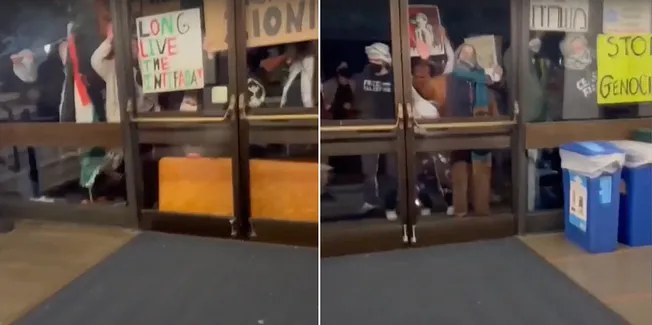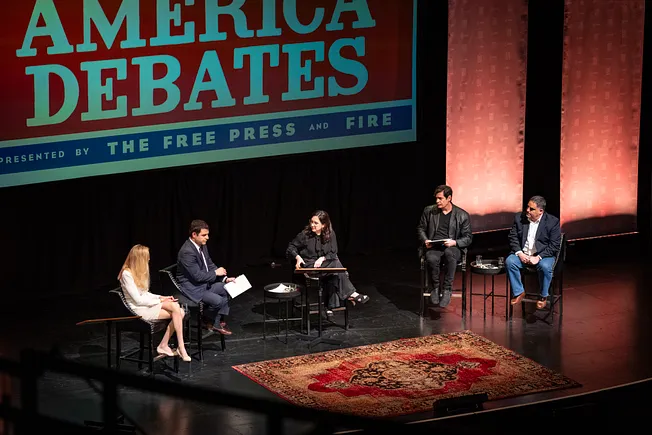It’s said that civilization was founded the moment a man flung a word at his enemy instead of a spear. On our most elite college campuses—most recently, the University of California, Berkeley—the plan seems to be to unfound it.
Earlier this week, a student group called Bears for Palestine published on Instagram its intention of “combatting lies” by shutting down an event featuring Israeli Defense Forces reservist and lawyer Ran Bar-Yoshafat.
“This individual is dangerous,” the post continued. “He has committed crimes against humanity, is a genocide denier, and we will not allow for this event to go on. . . . SHUT IT DOWN.”
Before the event was scheduled to begin Monday evening, hundreds of student protesters descended on the building where it was supposed to take place—banging on doors and windows, preventing students from entering, forcing their way in, and shouting “intifada, intifada.”
Protesters broke glass doors. One male student alleges being spit on by a protester. Another student—a woman—was injured. Yet another student claims that “Jew” was screamed as an epithet.
The mob got their way. The event was canceled. Bar-Yoshafat, along with the students who had attended the event, were escorted out the back of the theater.
This has to stop.
UC Berkeley Chancellor Carol Christ and Executive Vice Chancellor and Provost Benjamin Hermalin posted a note the next day on the university website expressing their “deep remorse and sympathy to those students and members of the public who were in the building, fearing for their safety.”
They went on to say that, in the days ahead, they would “decide on the best possible path to fully understand what happened and why; to determine how we will address what occurred; and to do everything possible to preclude a repeat of what happened.”
Please. We know exactly how this eruption should be addressed.
Any students who took part in the violence should be expelled—assault is a crime and most certainly violates the school’s code of conduct. As for the students who organized the shutdown but did not participate in the violence, they should be punished.
Everyone has a right to due process. But violent rioters have no place at any institution devoted to the fearless pursuit of truth. Certainly not at Berkeley, home of the Free Speech Movement.
Violence is not extreme speech, but the antithesis of speech—and the antithesis of what higher education is supposed to be all about.
Over the past decade, freedom of speech, and academic freedom more generally, have suffered terribly. Since 2014, more professors have lost their jobs for expressing an unpopular viewpoint than at any point in the past 80 years—especially in 2020 and 2021.
While the cancellations have tapered off somewhat in 2023—even the most rabid cancelers eventually run out of witches to burn—something just as awful has replaced them: a huge uptick in campus shout-downs, some of which turned violent.
Berkeley, of course, was the site of one of the worst demonstrations against freedom of speech in recent memory: in 2017, when 1,500 rioters caused $100,000 in damages and injured six to protest a planned speech by right-wing provocateur Milo Yiannopoulos.

It’s not just Berkeley, of course. At Stanford, in March 2023, students shouted down conservative judge Kyle Duncan, who was scheduled to speak. That same month, students at UC Davis violently shouted down right-wing pundit Charlie Kirk. The next month, at the State University of New York at Albany, students shouted down conservative podcaster Ian Haworth, who was accused of transphobia. And two days later, NCAA swimmer Riley Gaines, who has been vocal about transwomen not competing in college women’s sports, was allegedly assaulted while speaking at San Francisco State University.
And all of that was before the dramatic spike in violent protests and shout-downs that have become increasingly regular on campus since Hamas attacked Israel October 7.
The distinction between speech and violence is one of the greatest intellectual developments in the history of civil society, stretching all the way back to fifth-century Athens. It enables us to make room for the widest possible array of ideas and arguments, while keeping at bay bad actors who lack respect for that pluralism.
It should not come as a great surprise that many in the “words are violence” set resort to actual violence when it comes to speech that upsets them—they lack respect for the liberal clash of ideas that the ancient Greek philosophers popularized and that has characterized Western society for centuries, if not longer.
After the Yiannopoulos cancellation in 2017, then-chancellor Nicholas Dirks wrote a response in defense of free speech, but Berkeley showed cowardice in its unwillingness to punish the rioters. It wasn’t for lack of evidence, either. Rioters bragged about it on social media and elsewhere, and it would’ve been possible to identify those students who were involved.
The failure to do so had predictable results all over the country as shutdowns and shout-downs have become commonplace. Indeed, 2023 was the worst year for the heckler’s veto we have seen in FIRE’s 25-year history.
Contrary to what many students—and embarrassingly too often, grown adults—argue, violence, heckling, and shutdowns of events are not free speech, but its hideous and counterproductive opposite. The principles enshrined in our First Amendment were meant to allow us to solve our differences through vigorous dialogue and debate, without resorting to acts of violence and intimidation. Our institutions of higher education must actively preserve and defend these principles. Doing otherwise will lead to more of the mayhem we witnessed this week at UC Berkeley, and which we’ve witnessed on campuses across the country in the last few years.
Behavior that is rewarded gets repeated. If students that flagrantly and proudly violate the norms of free inquiry, open discourse, and freedom of speech on campus are not disciplined, the inevitable consequence will be even less hesitation to do it again.
Campuses must have the highest tolerance for opinion and expression, but no tolerance at all for violence.
Greg Lukianoff is the president and CEO of the Foundation for Individual Rights and Expression (FIRE). He is also the co-author of The Canceling of the American Mind. Angel Eduardo is a senior writer and editor at FIRE.
For more on free speech on America’s college campuses, become a Free Press subscriber:









